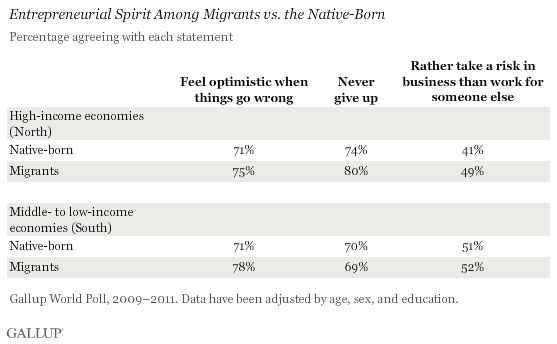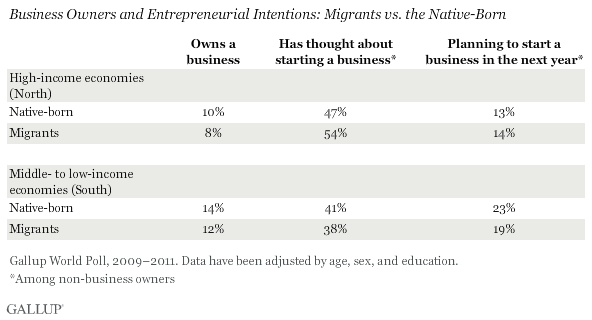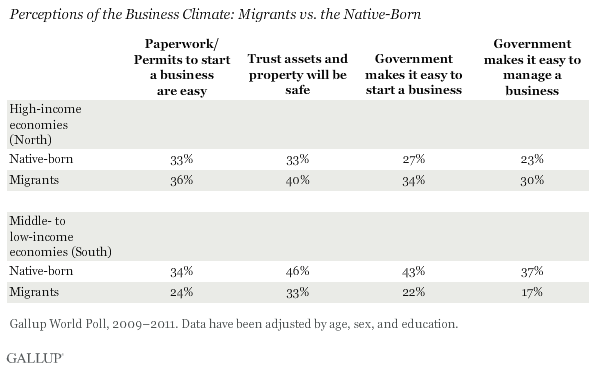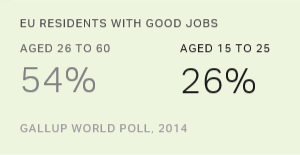WASHINGTON, D.C. -- Some migrants may be born entrepreneurs. Migrants living in high-income economies are more likely than the native-born to have three characteristics that differentiate entrepreneurs from the rest: they feel optimistic even when things go wrong, they never give up, and they are willing to take risks. There are fewer differences between migrants and the native-born in middle- to low-income economies, but migrants are still more likely to feel optimistic when things go awry.

These findings, featured in the International Organization for Migration's World Migration Report 2013, are based on Gallup World Poll interviews with nearly 25,000 first-generation migrants and 442,000 native-born residents in 150 countries between 2009 and 2011. Gallup groups migrants and the native-born by whether they live in high-income economies (referred to as "the North") or middle- to low-income economies (referred to as "the South").
Migrants in High-Income Economies as Likely as Native-Born to Own a Business
In the North, the native-born and migrants are as likely to own their own business. At the same time, among those who are not already business owners, migrants are more likely than the native-born to have thought about starting a business (54% and 47%, respectively) and as likely to be planning to start one in the next 12 months. In the South, migrants are slightly less likely than the native-born to own a business. Among non-business owners, however, migrants in the South are as likely as the native-born to have thought about starting or plan to start a business.

Migrants in "North" Positive About Business Climate
All migrants living in the North are more optimistic than the native-born about almost all aspects of the business climate: they consider doing paperwork/obtaining permits to be easy, they trust assets and property will be safe, and they say that the government makes it easy to start and manage a business. They are, however, less likely to know someone with whom they could go into business, which may be an obstacle for migrants who are unfamiliar with the business practices, traditions, and culture in the country they have moved to. This may help explain why migrants in the North, who are more likely to show entrepreneurial spirit than the native-born, are not more likely to own a business.

On the other hand, migrants living in the South are less likely than the native-born to view the climate as business-friendly; for example, 22% of migrants believe that the government makes it easy to start a business and 17% of migrants believe the government makes it easy to manage a business (compared with 43% and 37%, respectively, of the native-born). This possibly explains why migrants in the South, who show the same level of entrepreneurial spirit as the native-born, are less likely to own a business.
Bottom Line
While governments cannot imbue people with entrepreneurial spirit, they can make it simpler for those with entrepreneurial ambition to start a business. For instance, they can make accessing training, mentors, and startup funds easier. Other Gallup research shows that social capital is important at every stage of entrepreneurship, but particularly in the start-up phase.
Governments can also remove either real or perceived obstacles that make rules and regulations seem less business-friendly. Networks that connect potential migrant entrepreneurs with successful native-born entrepreneurs would also be valuable because the latter likely have access to social and financial support and may be willing to share some of the business startup risks.
IOM and Gallup will be presenting results from the World Migration Report at events in London and Washington, D.C., in coming weeks. Read the full report.
For complete data sets or custom research from the more than 150 countries Gallup continually surveys, please contact us.
Survey Methods
Results are based on Gallup World Poll data collected across 150 countries and areas in 2009, 2010, and 2011. The typical sample size was 1,000 per country per year. Projection weighting was performed so that each country's data are proportional to the total world population. A total of 466,689 adults were included in the analysis, including 441,901 native-born residents and 24,788 first-generation migrants. Countries were classified as "North" (high-income economies) or "South" (middle- to low-income economies) according to World Bank categories. Migrants surveyed were born in 188 countries (51 of which were in the North and 137 were in the South) and lived in 150 destination countries (40 in the North, 110 in the South).
For more complete methodology and specific survey dates, please review Gallup's Country Data Set details.
